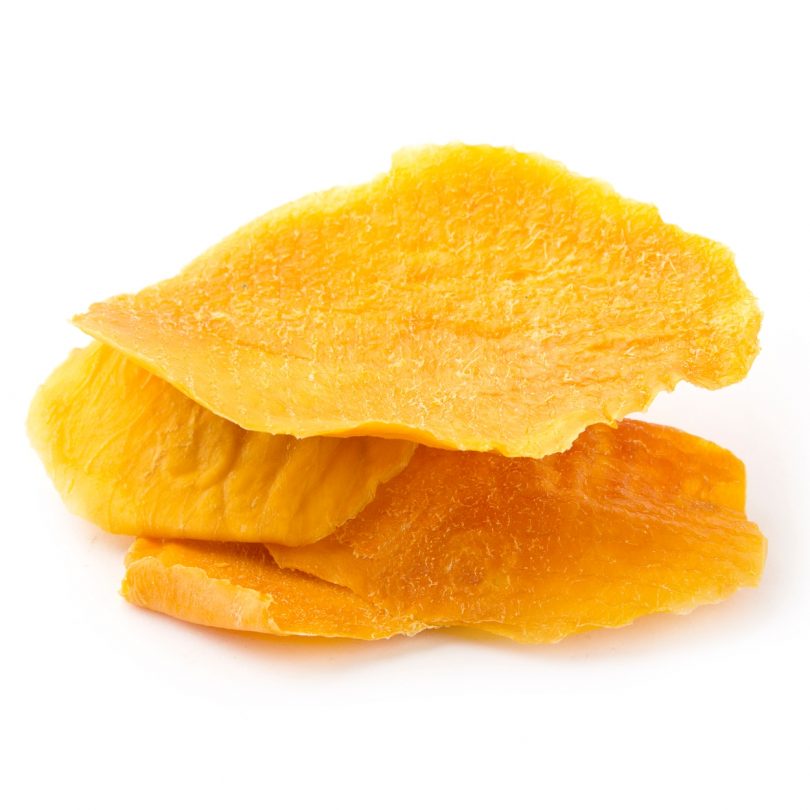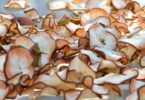Find out, what are the main health benefits of dried mangoes.
Aside from being one of the most sought after exotic tropical fruits due to its delicious pulp, the mango is considered one of the super fruits. Its impressive list of nutrients is similar to that of a food supplement! It is packed with vitamins, minerals, and antioxidants that our body needs for protection, development, and proper function.
Dried mangoes are best eaten as snacks. They can also be added to cereals, grains, and salads. For mango lovers living in places where mangoes do not grow naturally, dried mangoes are a viable alternative.
Sugar and sulphites are traditionally incorporated in the process primarily to inhibit enzyme activities (which lead to spoilage), and to preserve the fruit’s color. Some manufacturers sell “all natural” variants of dried mangoes that do not undergo sugaring or sulphuring.
Admittedly, the process of drying leads to loss of some water-soluble vitamins, chief of which is vitamin C. Nonetheless, much of a mango’s nutritional content remains even after drying.
READ ALSO: Dehydrating Mangoes Made Simple: 3 Beginner-friendly Methods of Drying Mangoes
Aside from enjoying the delightful taste of this wonderful fruit, what health benefits do you actually get from dried mangoes?
Health Benefits of Dried Mangoes
Vitamin A
First dried mango benefit is related to vitamin A. In fact, dried mangoes are rich in vitamin A. This vitamin is vital for healthy vision, radiant skin, and a strong immune system. As such, eating dried mangoes can help improve eyesight, and treat eye conditions associated with aging, as well as eye disorders such as glaucoma and cataract. The vitamin A in dried mangoes also helps treat skin conditions such as acne, psoriasis, eczema, and burns, among others. It is also known to prevent the effects of exposure to the sun, and of skin aging. It likewise promotes the healing of wounds.
The vitamin A of dried mangoes is enhanced by the same component that gives mangoes (and other fruits and vegetables) their red, yellow and orange colors. Once ingested, our body converts them into this essential nutrient.
Fiber plus more
Dried mangoes contain soluble fibers that not only aid digestion and cleanses the digestive system, but also helps lower cholesterol and aids in weight loss. Add to that the fact that mango contains enzymes called amylases that help break down food for easier absorption. They also help break down complex carbohydrates into simple sugars.
Antioxidant properties
As with other superfruits, mangoes contain compounds that act as antioxidants. Antioxidants protect our cells from free radical damage often associated with cancer, diabetes, and aging. One such antioxidant is called mangiferin, which has been a subject of a number of studies. These studies all point to the ability of mangiferin to prevent and counter damages to cells in various parts of the body.
Good for women
Dried mangoes contain doses of folate that when oxidized, turns into folic acid. Folic acid is considered an essential prenatal nutritional supplement. It is essential in the proper development of a baby’s brain and spinal cord, thus preventing any defects associated with underdevelopment of a baby’s nervous system.
In addition, dried mangoes also contain calcium and iron, which are essential to bone health, especially during pregnancy and aging. Iron helps prevent anemia, a condition that women can be prone to during and after their monthly periods.
Mood boosters
Dried mango’s reputation as a mood booster arises from its high levels of B-vitamins, namely B1 (thiamin), B3 (niacin), B6 (pyridoxine) and B9 (folate). These vitamins are commonly found in popular multivitamin supplements. They are marketed as promoting an alert mind, helping to fight stress and maintaining stamina all day long. They are touted to aid in nerve regeneration in older people and proper neural development in babies.
READ ALSO: VITAMIN B1: Benefits, Side Effects, Sources, and Daily Dosage
Some supplements even claim that they boost metabolism, thus resulting in increased energy and more calories burned. These claims help reinforce their reputation as happiness vitamins or mood boosters. And these can all be found in dried mangoes!
High in manganese and copper
Manganese and copper are trace minerals that are present in dried mangoes in ample amounts. Manganese is a mineral which is necessary in a wide range of bodily functions such as tissue and bone formation, blood clotting, and metabolism of fats and carbohydrates. Manganese deficiency can lead to osteoporosis, osteoarthritis, anemia, and dysmenorrhea.
On the other hand, trace amounts of copper are necessary for the formation of red blood cells, nerve health and strong immune system. While it may be rare, copper deficiency can be a life-threatening condition. Just the same, copper need not be taken as a supplement as it is present in most foods such as dried mangoes.
Dried mangoes also contain potassium, which is essential to muscular function, including those in the heart and lungs. A condition called hypokalemia can occur as a result of potassium deficiency.
Essential vitamin C
While some of the vitamin C in mangoes is lost in the drying process, a decent amount still remains in dried mangoes, helping boost your immune system and repair tissues. Vitamin C, also known as ascorbic acid, hastens recovery from the common cold, and even protects against cancer-causing free radicals. Eating dried mangoes naturally prevents symptoms associated with vitamin C deficiency such as rashes, bleeding gums, and the disease called scurvy.
While dried mangoes make for a delicious snack and are rich in nutrients, the fact remains that they are packed with sugar and calories. As such, you should consume it in moderation.
People with a sensitivity to sulfites used in the drying process of mangoes should also consult their doctor before consuming dried mangoes.
READ ALSO: 10 Amazing Benefits of Dehydrating Food





